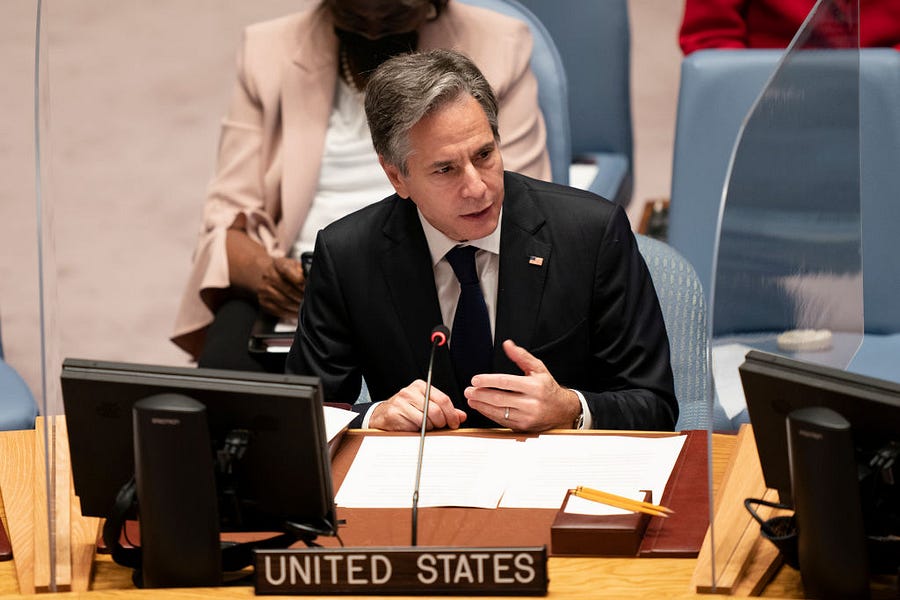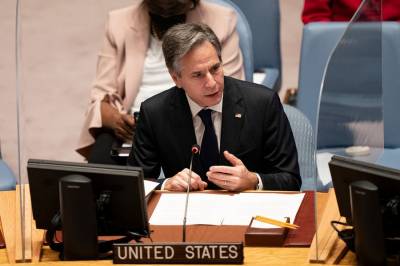On September 16, Secretary of State Antony J. Blinken criticized the disqualification of seven Hong Kong local level politicians in a tweet pledging, as he has in the past, to “stand with the people of Hong Kong.” The district councilors had fallen afoul of a new loyalty test to the Chinese Communist Party. China has already demolished Hong Kong’s partial democracy, reducing the number of elected seats in the citywide Legislative Council and exerting even more control over the process of installing Beijing’s pick for the city’s chief executive. December elections for the Legislative Council will give Beijing a rubber stamp body, much like the one it has on the mainland.
Blinken’s tweet was accurate and unremarkable, but soon the State Department took it down and posted a new, less forthright one, apparently after the Chinese Foreign Ministry criticized “irresponsible comments from certain US politicians.”
The State Department explained that it intended the tweet to come from spokesman Ned Price’s account and not Blinken’s. (And Price’s version of the tweet is still live.) Still, it’s worth looking at the differences between the original and the watered-down replacement. In addition to dropping the “stand with” pledge, the new tweet omitted support for “fundamental human rights & freedoms.” Instead Blinken offered the anodyne “government should serve the people they represent.” Of course, Chinese Communist cadres will have little beef with that. Since Mao’s time, it has been routine to emphasize that “the party serves the people.”
Chinese Communist Party leaders take the language used to advance values seriously. The party, writes Nadège Rolland, seeks “discourse power,” which is “the ability to exert influence over the formulations and ideas that underpin the international order.”
Rather than export a particular ideology, the party seeks to gain authority and legitimacy at the expense of the U.S. and its allies by blurring the distinction between the CCP ‘s Marxist-Leninist dictatorship and democracy. Recently China’s ambassador to the U.S., Qin Gang, appropriated Abraham Lincoln’s stirring language from the Gettysburg Address to equate his party dictatorship with America’s democracy. “Shall we understand China’s socialist whole-process democracy as this: from the people, to the people, with the people, for the people?” Using important institutions as a forum for such remarks, as Qin did by addressing the Carter Center and the George H.W. Bush Foundation for U.S.-China relations, which have been funded by a Chinese influence-peddling organization, also advances Beijing’s agenda.
Blinken’s second, replacement tweet invoked “the spirit of Hong Kong’s Basic Law,” referring to a document often called Hong Kong’s mini-constitution. The Basic Law is a product of the mainland National People's Congress, and a body of the NPC has the power to interpret the law. The phrase “spirit of the Basic Law” has been used by mainland legal functionaries to indicate it is for the party alone to say what it means.
Perhaps Blinken wanted to tread lightly while the finishing touches were being put on the recent deal to swap Meng Wanzhou—the Huawei executive who admitted misleading law enforcement about the company’s activities in Iran—for the Chinese-held Canadian hostages Michael Kovrig and Michael Spavor. (Two American siblings who had been prevented from leaving China for two years were also allowed to leave China in recent days, although their mother, also an American citizen, was not.)
Until the Biden administration recognizes the strategic value of democracy and human rights, there will always be a reason to soft-pedal them. Reportedly, American officials are frustrated that China links cooperation on climate change to other matters in the bilateral relationship—such as support for Taiwan and sanctions against Chinese officials for the national security crackdown in Hong Kong. A Chinese foreign ministry readout of a September 1 video conference between Foreign Minister Wang Yi and climate envoy John Kerry said that the U.S. desire for climate cooperation to be an “oasis” in bilateral relationship will be unworkable “if the oasis is all surrounded by deserts.” But the administration ought not focus on a climate change deal to the exclusion of other goals, especially considering Beijing’s record of violating promises including the 1984 Joint Declaration, which guaranteed Hong Kong’s autonomy and civil liberties, or the promise not to militarize islands in the South China Sea.
Subordinating democracy and human rights is counterproductive in another way as well. Without forthright support for universal values—including for China’s own citizens—Beijing can portray America’s alliances with democracies in the region as “anti-China” rather than the defense of free societies and the rule of law.
Tailoring language on Hong Kong to avoid upsetting China’s CCP leadership has damaged American credibility in advance of the Summit for Democracy in December and raised questions about its Hong Kong policy. Adapting to the lexicon Beijing uses for governance, democracy, and rights would be an even more damaging development.
A deleted tweet might seem a minor thing, but no one should expect that it will lead China to become more cooperative. Instead, it will be seen in China as a victory and a sign of American weakness. If the Biden administration wants China to undertake and fulfill commitments in the future, it should act as if it expects Beijing to uphold ones it has made previously. To undo the damage, the Biden administration should start by imposing more serious consequences on Beijing for its repression in Hong Kong and speak more, not less, about freedom and human rights.
Ellen Bork writes about American foreign policy with a focus on democracy and human rights.






Please note that we at The Dispatch hold ourselves, our work, and our commenters to a higher standard than other places on the internet. We welcome comments that foster genuine debate or discussion—including comments critical of us or our work—but responses that include ad hominem attacks on fellow Dispatch members or are intended to stoke fear and anger may be moderated.
With your membership, you only have the ability to comment on The Morning Dispatch articles. Consider upgrading to join the conversation everywhere.